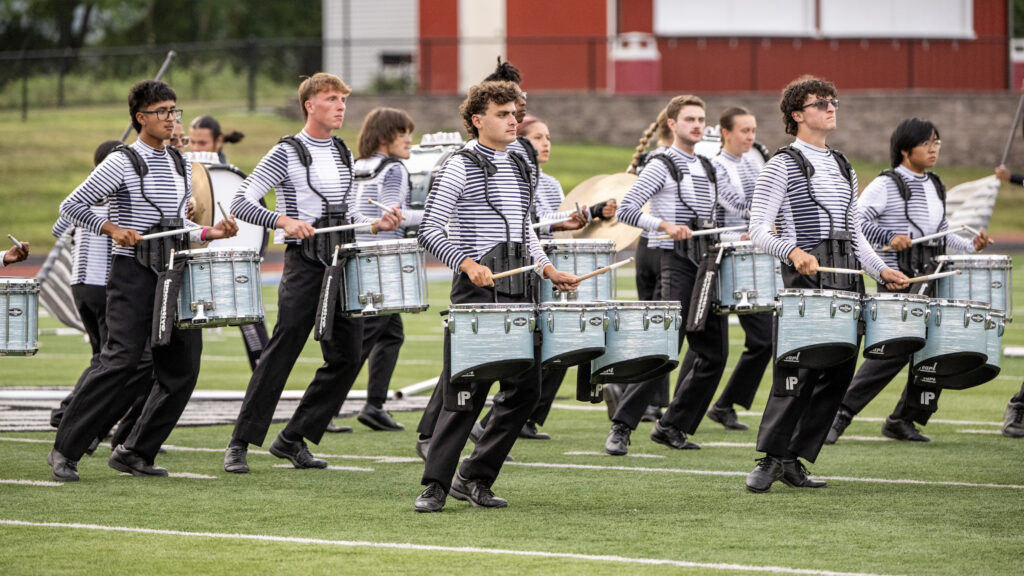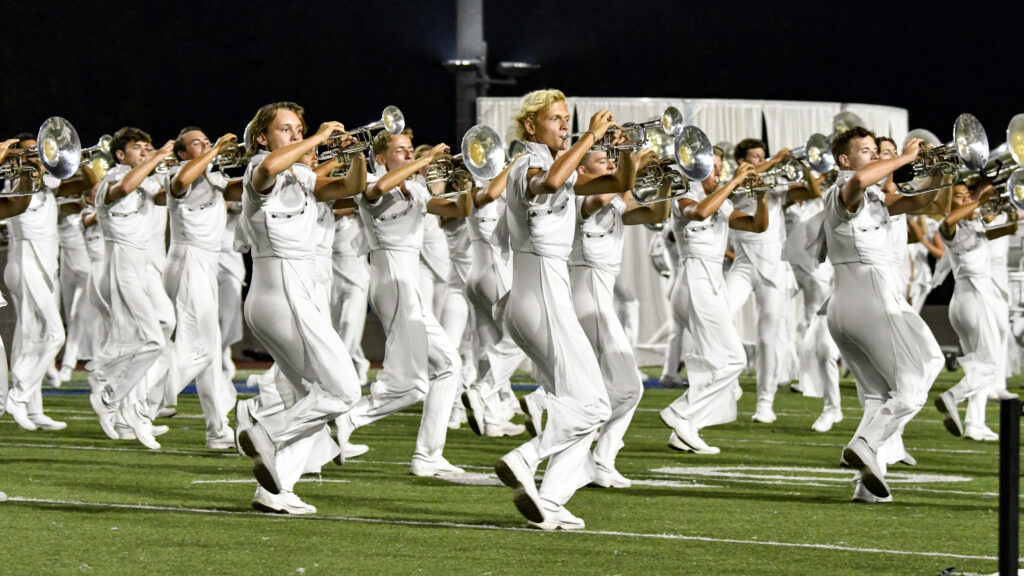
The July 18 installment of Fanfare featured the stories of two people who discovered the joy of marching in a small corps.
In this installment, we meet two more people who share the same love of smaller corps; Randall Musgrave, who marched Florida Wave, and Scott Carter, who marched Southwind before it evolved into a Division I corps. Here’s Randall’s story. “Florida Wave was a very small Class A corps when I marched in the early 1980s; we only marched 69 members total, including pit and guard.
We operated on a shoestring budget, as do most small corps, but we had a great fan base and a close-knit group. “One memory that sticks in my mind was our performance at The Key to the Sea Open in Toledo, Ohio. Whenever we marched in our class, we were pretty much unstoppable. This time, however, we came in third place in prelims. Our whole staff was livid. They decided to shock the judges for the following day.
We worked all the rest of that day and night on a completely different show formation for our last two songs. We nailed every mark, and the judges were amazed! They thought we had been practicing this for weeks, and decided to bring it out that night. “Needless to say, we won that competition, along with four other majors in Class A that year. Our showdown with adversity was a tough one, but we came out on top. That was the most fulfilling weekend of the summer for me, because of all the work that was involved. “I’ve given it a little thought.
One thing I do know about the small corps is their accessibility. In 1983, we had only two corps in Florida, Suncoast Sound and Florida Wave. Suncoast was an open class corps, and had hundreds of kids auditioning for a few open spots. Florida Wave was a small corps with lots of room for growth, so getting in wasn’t as difficult. Not to say that you didn’t have to be good, but you didn’t need to be a prodigy, either. “In the early 1980s, a lot of high school bands were focused on just the music, and the drill was secondary.
Imagination and precision weren’t as important as musical execution. Drum corps required not only musical execution, but flawless, intricate drill. We did things that most band directors would never think of, or couldn’t try if they did think of it. I remember trying to convince my band director to try this or that, and was met with great resistance. He said it was too hard, it couldn’t be taught to high schoolers, that it was college level stuff. I told him that this high schooler knew how to do it, and so could they. “I believe that being in a small corps requires a higher level of teamwork.
There are less people, so each person carries more of the load. If mistakes are made, they are obvious, forcing each and every member to concentrate that much harder. We knew each other intimately, knew each other’s strengths and weaknesses and worked to learn from them. I know that all corps do this, but I believe it is more important with the smaller groups. “As we saw at the DCI World Championships, Division II and III corps can excel and compete with the ‘big boys’ when that teamwork is really there. Talent, budget, and staff play a large part in sustained success, but hard work and determination are the true determining factors. “Incidentally, I know that drum corps is an addiction, but it’s a good one … one that I would like to see more teen-agers get.” Scott Carter attends school in Jacksonville, Ala.
Here’s his story. “I had my first drum corps experience when I was 12 years old. It was the summer of 1989, and like many people, I was sitting on the couch and trying to find something to watch on TV. I had been in marching band for two years, so when I came across a ‘marching band’ competition on public television, I was interested in seeing what it was. “I remember seeing a group leaving the field that the announcers called The Cavaliers. The next group on was Phantom Regiment. This was the first drum and bugle corps I ever saw.
It was amazing to me how a group of musicians could bring themselves to that level of excellence in such a short amount of time. I knew from that moment that I wanted to be a part of the activity. “It would be three summers before I saw my first live drum corps show. It was the summer of 1992 and the DCI South Championships were being held in Jackson, Miss. I saw the advertisements at a local music store and convinced my mother to take me.
I saw the Cavaliers, Blue Devils and Phantom Regiment. All three had become favorites of mine over time. “There was a corps there that I had never heard of before, a Division II corps by the name of Southwind. When they announced that the corps was from Montgomery, Ala., my mind went to work.
I realized that Montgomery was only about a four-hour drive from where I lived and that it was the only corps that close. After watching their performance (Southwind would go on to win their second Division II title later on that summer), I went straight to the Southwind souvenir booth and got as much information as I could. “We left the show and started our trip back home. I’m sure that by the time we got back my mother was sick of hearing about DCI. During that trip I never mentioned Southwind.
I was convinced that there was no way I could afford to march. Two months later I was having a conversation with my high school band director about the show and the information I had gotten about Southwind. Once I told him the name of the corps, his eyes lit up. “He said, ‘My best friend’s son marches with that corps, and they only live 15 minutes away.’ That was all I needed to hear. I knew that I had to try, that even if it turned out that I wouldn’t be able to march, I had to take advantage of the opportunity.
I got names and numbers from my director and started setting up my ride to the audition camp. “I was told to meet at a member’s house at 5 on Saturday morning, and I would be on my way to my first drum corps camp. I went to that house and met some people who would become very special to me over the next several months. There I was, a 16-year-old kid with people I had never met before in my life.
I still remember every one of them. (Derek, Melissa, Joni, Josh and Clint … if you’re reading this, drop me a line.) “We packed into a car and left. I went through my audition process and the weekend of various rehearsals, and loved every second of it. At the end of the weekend I was offered a third baritone spot and I was thrilled to get it. When I got home, my mother and I sat down and had a long conversation.
We worked everything out and I was going to be able to march drum corps, a dream I had had for a long time. I marched my first year, then my second, then my third. During this time I had still kept an eye on my favorite large corps and enjoyed watching them on the field. “During the summer of 1995, I watched that corps with particular interest. I’m not going to say who it was, because, in my opinion, it’s not important. During the off-season I got audition information from that corps and prepared an audition tape to send in, since the corps was a long distance away. I sent in my tape and about three weeks later got a response. In the response was a membership form, medical form, and the lead baritone audition parts. “I was confident in my playing and marching ability.
What I was concerned about were all the people I would be leaving behind. Southwind had just made the Division I semifinals show for the first time in corps history and I had made some lifelong friends in the corps. As I sat in my room with all the paperwork and music on my desk, I began to question myself. ‘Why did I want to go somewhere else?’ ‘If I did go and make the other corps, would I really be making a difference?’ “I weighed the pros and cons of both options and decided that I needed to stay with Southwind.
Not because they needed me, but because I needed them. “I marched five years with Southwind, aging out in 1997. 2003 will be my 11th summer with the corps. I served as tour manager from 1999 through 2001, and as a visual instructor from 2002 to the present. I don’t see myself working with another other corps any time soon. Southwind is my home and my life, and it always will be.”
Michael Boo has been involved with drum and bugle corps since 1975, when he marched his first of three seasons with the Cavaliers.
He has a bachelor’s degree in music education and a masters degree in music theory and composition.
He has written about the drum corps activity for over a quarter century for publications such as Drum Corps World, and presently is involved in a variety of projects for Drum Corps International, including souvenir program books, CD liner notes, DCI Update and Web articles, and other endeavors. Michael currently writes music for a variety of idioms, is a church handbell and vocal choir director, an assistant director of a community band, and a licensed Realtor in the state of Indiana. His other writing projects are for numerous publications, and he has published an honors-winning book on the history of figure skating. His hobbies include TaeKwonDo and hiking the Indiana Dunes. But more than anything, Michael is proud to love drum corps and to be a part of the activity in some small way, chronicling various facets of each season for the enjoyment of others.





